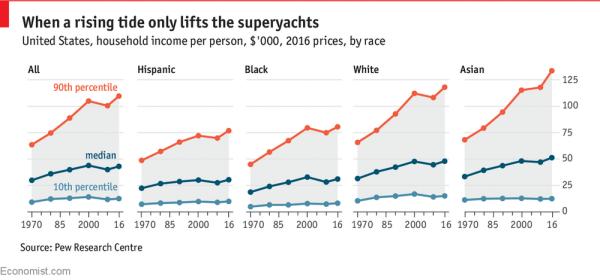Inequality data dark (and closed) ages
We badly need good inequality statistics. But not closed ones.

<u><em><strong>CAPTION:</strong>
<a href="https://www.economist.com/graphic-detail/2018/07/24/inequality-is-rising-relatively-slowly-among-black-and-hispanic-americans" target="_blank">Inequality rising slowly... but not for good reasons</a>
</em></u>
Back in December 2019, Thomas Piketty and other economists made an open call to escape the inequality-data Dark Ages. These are the main points of that call, with a final observation from me on how it should be answered.
Even as perceptions of rising inequality undermine the foundations of democracy, data on wealth and income trends remain woefully inadequate.
It is in the interest of all societies to develop an internationally recognized set of indicators and methods for tracking income, wealth, and effective tax rates accurately and transparently.
We are living in the Dark Ages of inequality statistics. More than a decade after the “Great Recession,” governments are still unable to track accurately the evolution of income and wealth.
This failure has huge costs for society. The perception that inequalities are reaching unjustifiable heights in many countries, combined with a lack of any possible informed choice for voters, is fodder for demagogues and critics of democracy.
To help inform the debate, more than 100 researchers from around the world have joined forces to develop innovative methods for compiling inequality statistics through the World Inequality Database (WID), which now covers more than 100 countries, and includes the widest possible array of available data sources.
But progress in measuring inequality has been hampered by recent policy developments, which belie narratives about greater transparency. It is critical that we develop an internationally recognized set of indicators and methods for tracking income and wealth.
All societies must start to engage more in the production and dissemination of transparent economic information. We call on all interested parties from civil society, the media, governments, and the academic community to join the effort to bring inequality data into the twenty-first century.
And my humble suggestion is…
What can I add to such a qualified call? Only the humble suggestion to demand that all those data are released as Five Star Open Data (to know what Open Data is, read these other posts of mine).
Image source: Economist
Who writes this, why, and how to help
I am Marco Fioretti, tech writer and aspiring polymath doing human-digital research and popularization.
I do it because YOUR civil rights and the quality of YOUR life depend every year more on how software is used AROUND you.
To this end, I have already shared more than a million words on this blog, without any paywall or user tracking, and am sharing the next million through a newsletter, also without any paywall.
The more direct support I get, the more I can continue to inform for free parents, teachers, decision makers, and everybody else who should know more stuff like this. You can support me with paid subscriptions to my newsletter, donations via PayPal (mfioretti@nexaima.net) or LiberaPay, or in any of the other ways listed here.THANKS for your support!